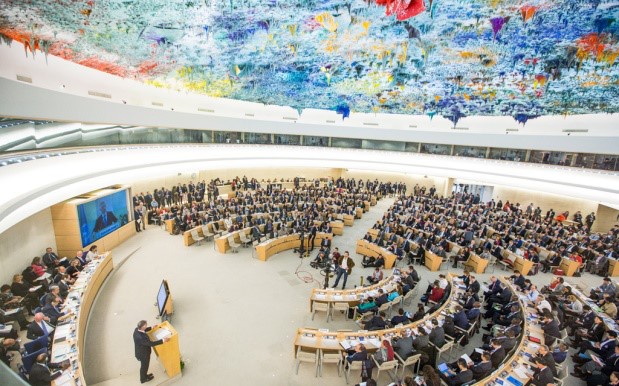
Geneva, Switzerland – From 18 June to 6 July 2018, Americans for Democracy & Human Rights in Bahrain (ADHRB) participated in the 38th Session of the United Nations (UN) Human Rights Council (HRC) and highlighted widespread human rights violations being committed by the Governments of Bahrain, Saudi Arabia, and the other Gulf Cooperation Council (GCC) States. ADHRB delivered 26 oral interventions, participated in three side events, and moderated a side event organized by the Gulf Centre for Human Rights whilst meeting with numerous states and UN Special Procedures mandate holders. Several of the human rights concerns raised by ADHRB were echoed by UN officials, NGO representatives, and State Representatives, with the European Union, United States, Belgium, Norway, Ireland, and Iceland iterating concerns about the human rights situations in Bahrain and Saudi Arabia.
On 18 June, the 38th session of the HRC began with the departing High Commissioner for Human Rights, Zeid Ra’ad al-Hussein, delivering his opening statement and global update. In his opening statement, the High Commissioner sharply criticized Bahrain for its continued refusal to engage and cooperate with the Office of the High Commissioner for Human Rights (OHCHR), the HRC, and the mandates of the Special Procedures. The High Commissioner noted that Bahrain was among the 40 states who had not allowed any visits by a Special Rapporteur over the past five years, and that it also had more than five pending visits from the Special Procedures. The High Commissioner emphasized Bahrain’s continued campaign of suppression of civil society, as well as its use of legislation to curtail fundamental human rights, and he urged the kingdom to “reverse these profoundly damaging trends and to facilitate effective engagement with the international human rights mechanisms.”
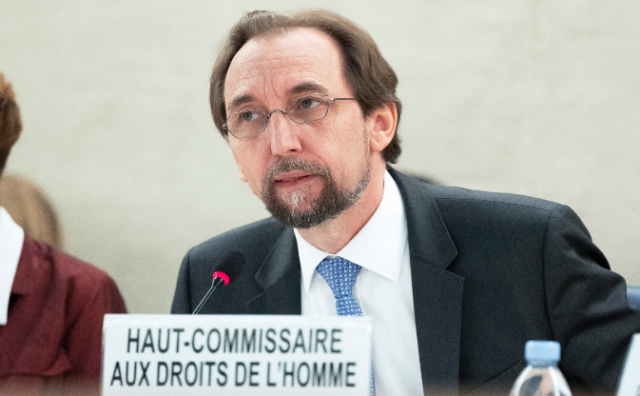
ADHRB delivered its first interventions on 19 June, during the General Debate under Agenda Item 2, with Yusuf al-Hoori speaking on behalf of ADHRB and raising concerns about the violent suppression of the peaceful protests in Duraz by Bahraini state authorities, which culminated in the arbitrary arrests of 287 people and the death of five men. ADHRB’s intervention sharply criticized the lack of accountability for Bahraini security forces who engaged in extrajudicial violence, which has led to the creation, and perpetuation, of a climate of impunity for security force violence.
In its second oral intervention under Item 2, Michael Payne, ADHRB’s Director of Advocacy, discussed the spurious free expression charges facing prominent Bahraini human rights defender Nabeel Rajab, as well as the continued detention of other human rights activists on similar charges, like Dr. Abduljalil al-Singace and Sheikh Ali Salman. In his intervention, Payne thanked the High Commissioner for his continued efforts to highlight these cases. He concluded his intervention by calling on Bahrain to immediately release all political prisoners in order to ensure that its upcoming parliamentary elections are legitimate, free, and fair.
ADHRB’s Advocacy Associate delivered the final oral intervention under the Item 2 General Debate. Pry’s remarks focused on Saudi Arabia’s arrests of women’s right defenders such as Loujain al-Hathoul, Aziza al-Yousef, and Eman al-Nafjan in May 2018. In his intervention, he also denounced the public defamation campaign conducted by Saudi state media against these activists after their arrests, and he called for the immediate release of the detained activists.
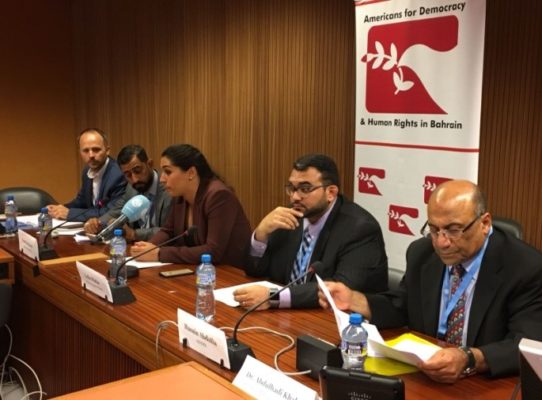
On 2 July, ADHRB, in cooperation with ten NGO co-sponsors, held its first side event of the Council session. The event, titled “Not Free, Not Fair: Bahrain 2018 Parliamentary Elections,” addressed whether Bahrain’s upcoming parliamentary elections can fulfill the conditions for an internationally-recognized free and fair election. The panel assessed how the situation in Bahrain impacts the election, keeping in mind the absence of strong free expression and free assembly protections. Laila Matar of Human Rights Watch moderated the panel, and the panelists were Husain Abdulla, Executive Director of ADHRB; Dr. Abdulhadi Khalaf, an academic and former Member of Parliament in Bahrain; Kevin Whelan of Amnesty International; and Yusuf al-Hoori, a Bahraini activist. In assessing the political climate surrounding the upcoming elections, the panelists discussed a variety of issues, including the dissolution of opposition groups ahead of the elections, the trend of denaturalizations, and the deteriorating human rights situation and shrinking civic space overall. Hanging over the panel was the noticeable, but unavoidable fact that no-one currently living in Bahrain was speaking on the panel, due to ongoing concerns about reprisals for attending the HRC session as well as the lack of space for a viable civil society panelist to be able to speak.
Two days later, on 21 June, ADHRB, in partnership with six co-sponsors, hosted its second side event entitled, “From Yemen to the Eastern province: Saudi Arabia’s Regional and Domestic Rights Abuses.” The event focused on Saudi Arabia’s domestic and regional human rights violations, and highlighted the domestic campaign of repression of human right activists and the regional humanitarian crisis in Yemen. ADHRB’s Advocacy Associate moderated the panel, which featured Bonyan Jamal from Mwatana, a Yemeni human rights organization; Dana Ahmed from Amnesty International; Zena Tahir from the European Saudi Organisation for Human Rights (ESOHR); and Jeremie Smith from the Cairo Institute of Human Rights Studies. Over the course of their remarks, the panelists addressed human rights abuses perpetrated by Saudi Arabia, highlighting the recent negative political and legal reforms leading to a spate of arrests and deployment of executions as a political tool, in addition to rights abuses in Yemen by all parties to the conflict and what the international community can do to end the conflict.
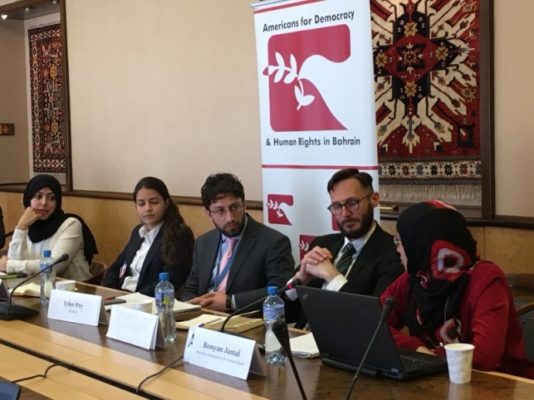
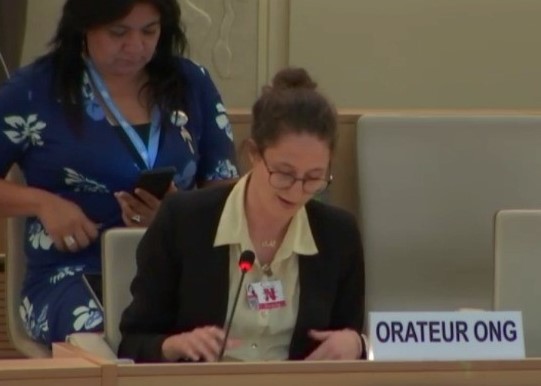
On 22 June, ADHRB delivered five interventions under the Item 3 General Debate and Item 3 Clustered Interactive Dialogues. Speaking on behalf of ADHRB, Legal Fellow Annabel Bassil delivered an oral intervention during the Clustered Interactive Dialogue with the Special Rapporteur on Poverty and the Special Rapporteur on Internally Displaced Persons (IDPs). The intervention addressed the Rapporteur on IDPs and highlighted the likely internal displacement which would be caused by the Saudi-led coalition’s attack on Hodeidah in Yemen. Bassil noted that the attacks on civilians and civilian infrastructure would potentially create 200,000 IDPs, who would be forced to seek refuge in already-overcrowded refugee camps, thus further straining scarce humanitarian resources. The intervention concluded by asking the Rapporteur on IDPs to give recommendations for mitigating the impact of the attack on innocent Yemenis.
On Monday June 25th, Salma Moussawi spoke on behalf of ADHRB and raised concerns over ongoing restrictions on freedom of expression in Bahrain. Moussawi cited Nabeel Rajab’s sentence, and referenced it as an example of restrictions on expression. She further detailed the closure of Al-Wasat, Bahrain’s only semi-independent newspaper as an evidence of the suppression of free press in Bahrain.
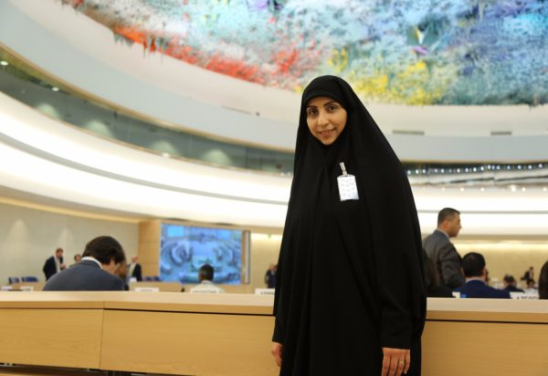
On the same day, ADHRB’s Legal Fellow Bridget Quitter delivered an intervention under the Item 3 General Debate on behalf of ADHRB, in which she called attention to the Bahraini government’s denial of healthcare to prisoners in Isa Town Women’s Prison and the notorious Jau Prison. Her intervention also highlighted the cases of high-profile political prisoners such as Abdulhadi al-Khawaja and Dr. Abduljalil al-Singace in Jau Prison, who have been targeted by the Bahraini government and Fawzeya Mashalla, who has been denied healthcare in Isa Town Women’s Prison. She further raised concerns on the overcrowded, unsanitary and violent nature of the prisons.
Quitter delivered a second oral intervention under the Item 3 Clustered Interactive Dialogue with the Special Rapporteur on Independence of Judges and Lawyers, in which she discussed the direct appointment of judges by Bahrain’s king. Highlighting the lack of an independent judicial council, she called attention to the broader lack of independence in Bahrain’s judiciary. The intervention concluded with a call for recommendations on states like Bahrain, where the Judicial Council itself is unbalanced.
That same day, ADHRB’s Advocacy Associate delivered an oral intervention on behalf of ADHRB. Speaking during the Item 3 General Debate, Pry highlighted the restrictions on freedom of expression and opinion in the GCC States, with particular reference to Saudi Arabia and the United Arab Emirates. Pry drew attention to the arrests of activists, human rights defenders, journalists and bloggers for their dissident views. He highlighted in particular the cases of prominent clerics including: Salman al-Awda, Awad al-Qarni, and Ali al-Omari, who were arrested for calling for reforms and reconciliation with Qatar, and also made special mentions of Saleh al-Shehi, a journalist and columnist for Al-Watan, Nadhir al-Majid, Wajdi al-Ghazzawi, Alaa Brinji, and Raif Badawi who have been imprisoned for making comments critical of the Saudi government.
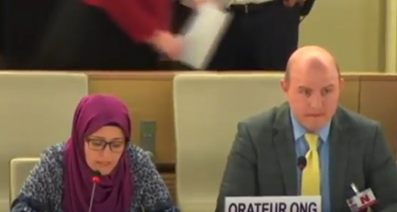
On Wednesday 27 June, ADHRB delivered two oral interventions under Agenda Item 4. Duaa Dhainy of ESOHR delivered the first intervention on behalf of both organizations. In her intervention, Dhainy raised concerns about the deterioration of the rights situation in Saudi Arabia, the increase in executions on bogus charges of terrorism, as well as the kingdom’s growing restrictions on civil society and dissidents. She noted that from January to June 2018, the Saudi government had carried out 53 executions, 44 percent of which were for crimes that are not considered serious under international law.
In the second intervention of the day, Bridget Quitter called attention to the plight of thousands of unknown citizens in prison in Bahrain. Quitter highlighted that hundreds of Bahrainis have been arbitrarily arrested and forcibly disappeared for months without being charged, before being sent to Isa Town Women’s Prison or the notorious Jau Prison. She highlighted in particular the cases of Sayed Kathem Ali, Sayed Ahmed al-Abbar, Fatima Dawood, and Zakeya al-Barboori as evidence of Bahrain’s arbitrary arrests and disappearance of average citizens.
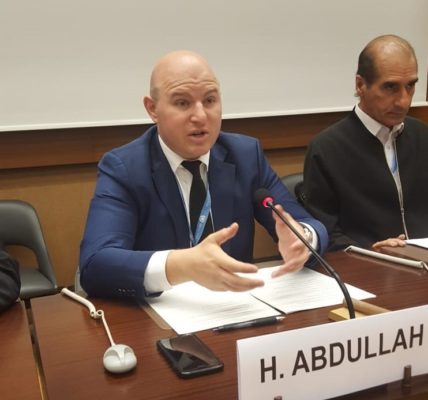
On 28 June, Michael Payne moderated a side event held by the Gulf Centre on Human Rights (GCHR) together with ADHRB, entitled “Business and Human Rights in the Gulf and Neighbouring Countries,” in co-operation with CIVICUS, Amnesty International, and the International Federation of Human Rights Leagues (FIDH). The panelists included Peter Micek from Access Now, Lene Wendland from the OHCHR, Gidou Battaglia from the Institute for Human Rights and Business (IHRB), and Khalid Ibrahim, the Director of GCHR. The discussion focused on different areas for cooperation in the fields of business and human rights, opportunities for partnerships between businesses and civil society, and the need for a multifaceted framework for businesses to engage with human rights. In his introductory remarks, Payne covered topics such as the Ruggie Principles on Business and Human Rights, and ADHRB’s past engagement with the Organization for Economic Co-operation and Development (OECD) in relation to the major sporting event, Formula 1 Bahrain Grand Prix, and the possibilities of human rights violations in such mega business and sporting events.
On 28 June, ADHRB delivered two oral interventions under Agenda Item 5. The first intervention raised concerns about reprisals against activists based in the GCC states for their engagement with the UN and its bodies and mechanisms. It placed special emphasis on prominent human rights activists Ahmed Mansoor and Dr. Nasser bin Ghaith, who have each been sentenced to ten years imprisonment on freedom of expression charges in the UAE. The intervention also highlighted Saudi Arabia’s repeated targeting, harassment, and detention of women’s rights activist Loujain al-Hathloul, as well as the brief detention of Yemeni human rights activists Radhya Almutawakel and Abdulrasheed Alfaqih as they attempted to travel outside Yemen. ADHRB called on Human Rights Council to firmly address all cases of reprisals and to consider suspending the membership of Saudi Arabia and the UAE.
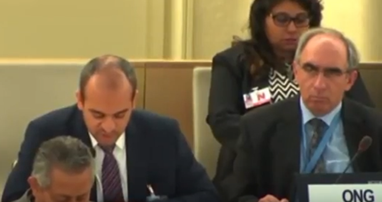
In the second intervention of the day, Ali Adubisi delivered an oral intervention on behalf of ADHRB and ESOHR. He spoke about the ongoing human rights violations in Saudi Arabia, in particular the widespread campaign against women’s rights activists. He also highlighted the continuing trends in the use of the death penalty, and the lowering of the age of majority from 18 years to whenever individuals show signs of physical maturity. Among the cases he raised are those of Samar Badawi and Loujain Al-Hathloul, both of who suffered reprisals for engaging with human rights bodies. Adubisi further highlighted Saudi Arabia’s continued use of the judicial system to legitimize repression, death sentences for minors and the imprisonment of those who call for reform.
On 29 June, during the Item 6 General Debate on the Universal Periodic Review (UPR), ADHRB delivered several oral interventions calling attention to various human rights concerns in the GCC. Bridget Quitter delivered an oral intervention calling attention to the United Arab Emirates’ disregard for the UPR process and its recommendations from the past reporting cycles. Of particular concern is the UAE’s failure to lift restrictions on freedom of expression and to end the systematic use of torture. On behalf of ADHRB, Quitter called on the UAE to demonstrate serious commitment to implementing its UPR recommendations by releasing all political prisoners, effectively ending torture, and lifting restrictions on free expression.
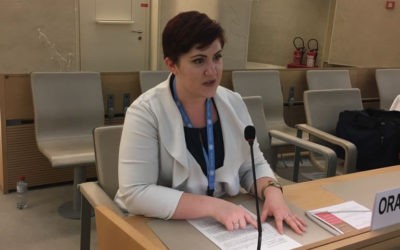
Shortly thereafter, Salma Moussawi gave another intervention on behalf of ADHRB regarding Bahrain’s lack of commitment to implementing its UPR recommendations pertaining to halting torture and ensuring accountability. Moussawi noted the widespread use of torture by Bahraini security forces and the lack of accountability for perpetrators of torture. This impunity has reached the highest levels, including personal acts of torture by Sheikh Nasser bin Hamad, the son of the king. The statement ended with a call on Bahrain to immediately investigate and prosecute all allegations of torture.
Wrapping up ADHRB’s interventions during the Item 6 General Debate, Pry called attention to Saudi Arabia’s upcoming 3rd Cycle UPR. In his statement, Pry noted that the UPR process is a good opportunity for states to engage on Saudi Arabia and address the systematic, widespread, and deteriorating human rights situation in the country. Saudi Arabia has undertaken three waves of mass arrests since September 2017 targeting political dissidents and members of the Shia minority. The kingdom has also shown an alarming rise in the use of capital punishment, with at least 33 people, mostly Shia, currently on death row for dubious terror charges. Pry, on behalf of ADHRB, called on States to critically engage in Saudi Arabia’s upcoming UPR in November 2018 and offer substantive recommendations in support of wide ranging reforms designed to promote and protect fundamental human rights.
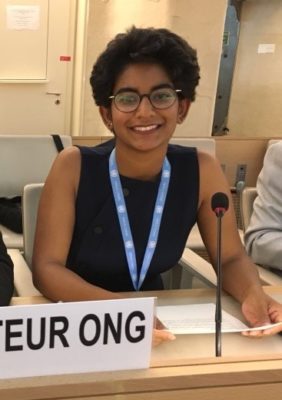
On 2 July, during the Item 8 General Debate on the Vienna Declaration and Programme of Action (VDPA), Malvika Verma spoke on behalf of ADHRB and delivered an oral intervention calling attention to widespread torture in the United Arab Emirates (UAE). The UAE frequently arbitrarily detains, and forcibly disappears residents who have spoken about human rights or criticized the Emirati government. In the intervention, she remarked in particular on the cases of Salim al-Aradi, Kamal al-Darat, Mohamed al-Darat, Ahmed Mansoor, Dr. Nasser bin Ghaith, and Sheikha Latifa bint Mohammad al-Maktoum.
During the same debate, Yusuf al-Hoori on behalf of ADHRB, delivered an oral intervention criticizing Bahrain’s culture of impunity and the government’s failure to punish security forces who commit human rights violations, including torture and extrajudicial violence. The intervention ended with a call for all States, including Bahrain, to end impunity for crimes committed by security forces and to ensure the protection of fundamental human rights like freedom of speech and assembly, in line with the VDPA.
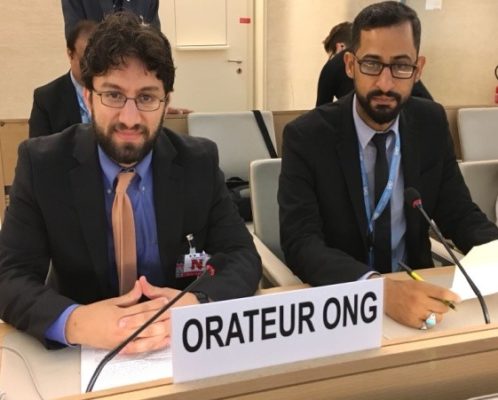
Pry delivered the third oral intervention under Item 8 General Debate on behalf of ADHRB. In his intervention, he called attention to the plight of women activists detained in Bahrain’s Isa Town Women’s Prison, including Najah Yusuf, Medina Ali, and Hajer Mansoor. Many of the women were tortured and subjected to sexual assault, and have been denied access to adequate healthcare. This has largely been at the direction of Major Maryam al-Bardouli, an official at Isa Town.
The Item 9 General Debate on the Durban Declaration and Programme of Action took place on 3 July. On behalf of ADHRB, Pry delivered a statement calling attention to Saudi Arabia’s continued discrimination against its Shia community. Particularly alarming is Saudi officials’ use of fabricated counter-terror charges to sentence members of the minority Shia community to death. There are currently over two dozen men on death row for religiously-motivated counter-terror laws, including Abdullah al-Zaher, Mojtaba al-Suwaiket, Ali al-Nimr, Dawood al-Marhoon, and Abbas al-Hassan. Pry concluded the intervention with a call upon Saudi Arabia to uphold the principles of the Durban Declaration by providing protections for, and working to end discrimination against, religious and racial minorities.
ADHRB delivered a second intervention during the Item 9 General Debate criticizing Bahrain’s targeting of Shia clerics and religious scholars. In 2017, the Bahraini government harassed, interrogated, arrested, or prosecuted over 70 clerics in a widespread campaign of suppression. An alarmingly high number of clerics have been sentenced to prison for their activism and outspoken criticism of the Bahraini government. ADHRB ended its intervention with a call on all states, particularly Bahrain, to uphold commitments to the Durban Declaration and to halt the prosecution of members of the Shia community.
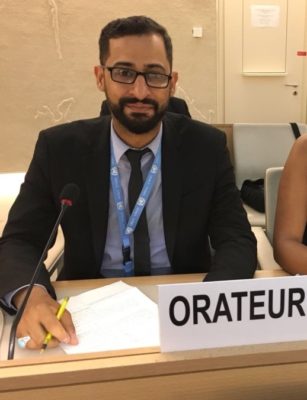
Yusuf al-Hoori delivered a third statement on behalf of ADHRB during the Item 9 General Debate. The intervention called attention to Bahrain’s discrimination against its Shia minority community, but drew particular attention to the arrests of prominent political and religious figures in Bahrain’s Shia community on illegitimate religion-motivated charges. He noted that Bahraini officials have shown an alarming willingness to revoke citizenship without any legal proceedings. ADHRB used the intervention to urge all states, including Bahrain, to uphold their responsibility to the Durban Declaration by working to end discrimination against religious and socio-ethnic groups.
ADHRB delivered a number of interventions on 5 July during the Item 10 General Debate. The first statement highlighted the UAE’s refusal to fulfill its 2nd and 3rd cycle UPR recommendations. Among them include recommendations promoting the right to free expression and criminal justice reform. The intervention called upon the UAE to engage with the Office of the High Commissioner for Human Rights in a program of technical cooperation to ensure the fulfillment of its UPR obligations.
A second oral intervention raised concern about Bahrain’s refusal to work and engage with the High Commissioner’s office and the Human Rights Council’s mechanisms. As parliamentary elections are scheduled to be held in fall 2018, Bahrain’s lack of a free and independent civil society poses an alarming obstacle to the country’s ability to conduct free and fair elections. ADHRB called on Council members to press the government of Bahrain to genuinely engage with OHCHR and to allow for transparent, independent international election monitoring.
ADHRB’s last statement for the 38th HRC session was delivered during the Item 10 General Debate and criticized Bahrain for refusing to engage with the OHCHR and the mandates of the Special Procedures. Bahraini authorities have continuously dismissed the work of the OHCHR and the Human Rights Council and prevented visits by special rapporteurs to the country. To conclude, ADHRB called upon Bahrain to issue standing invitations to any mandate to visit the kingdom, to accept the pending requests of Special Procedures, and to seek genuine cooperation with the OHCHR.
ADHRB would like to note the 38th Session of the United Nations Human Rights Council marks the seventh consecutive Council session in which cases of reprisals against civil society members in relation to the work of the Human Rights Council have been reported. Bahrain has a history of implementing widespread travel bans affecting a wide range of civil society actors and unfortunately these trends have only continued in 2018.
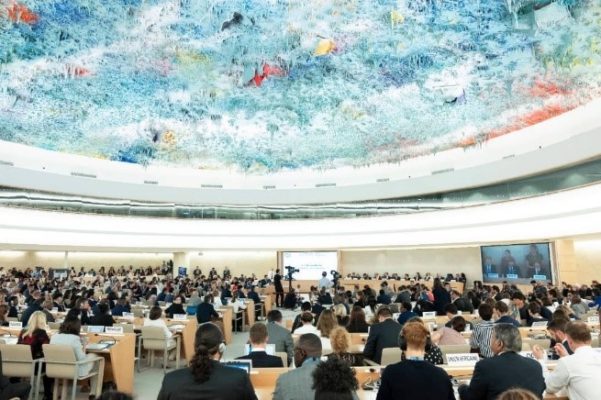
For a PDF of this statement, please click here




